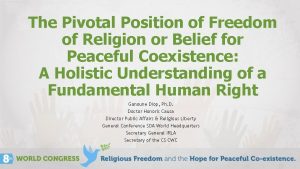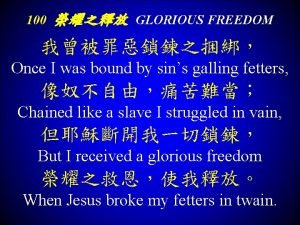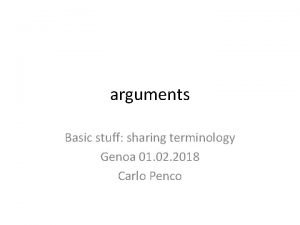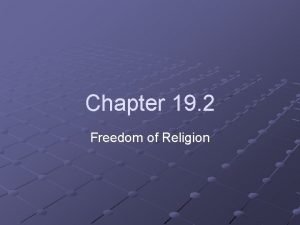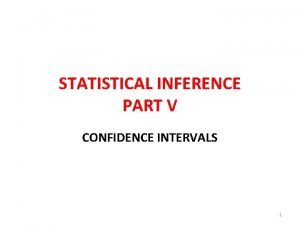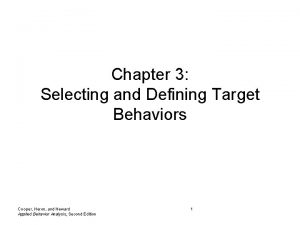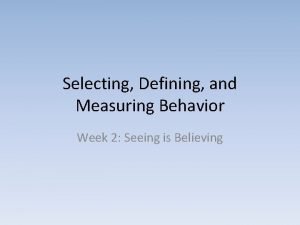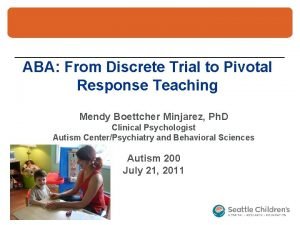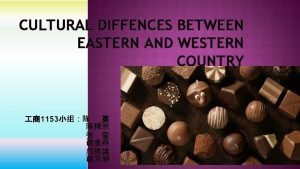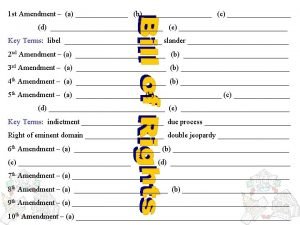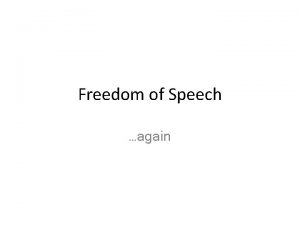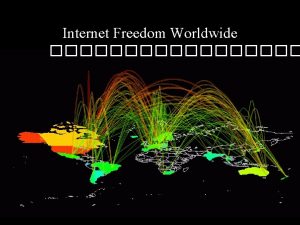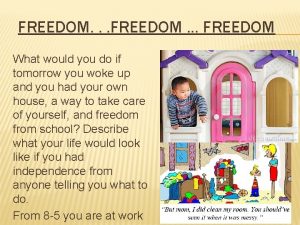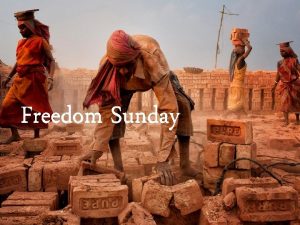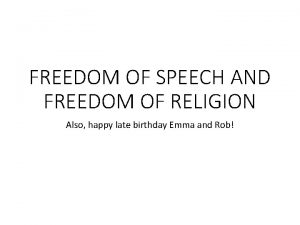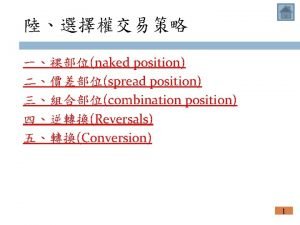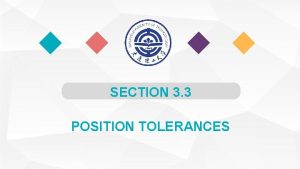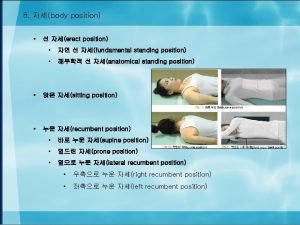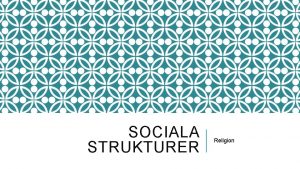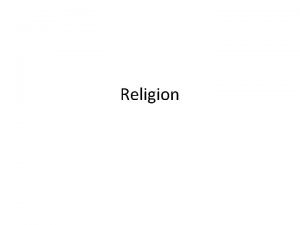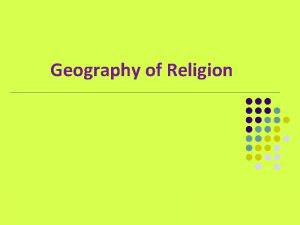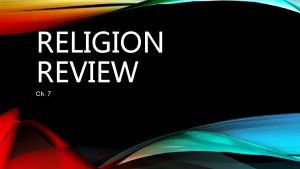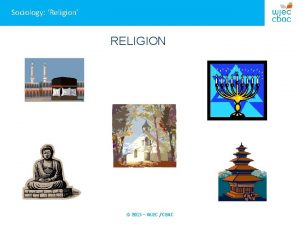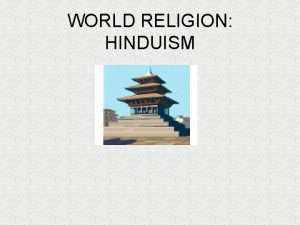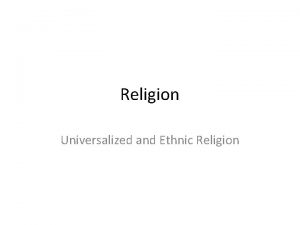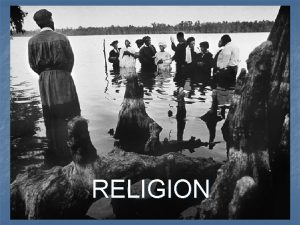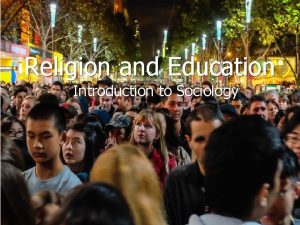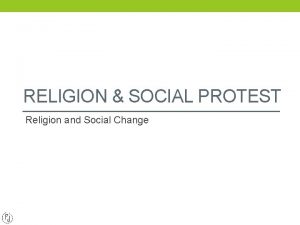The Pivotal Position of Freedom of Religion or





























- Slides: 29

The Pivotal Position of Freedom of Religion or Belief for Peaceful Coexistence: A Holistic Understanding of a Fundamental Human Right Ganoune Diop, Ph. D. Doctor Honoris Causa Director Public Affairs & Religious Liberty General Conference SDA World Headquarters Secretary General IRLA Secretary of the CS CWC

The Reason for our commitment to promote Religious Freedom ● Religious freedom is the expression intimate and sacred inner human disposition, human conscience. ● A person loses his or her most distinctive characteristic when one’s conscience is silenced, not allowed to operate, when it is in fact violated. ● Violence against a person in order to force that person to go against his or her conscience negates their humanity.

● Slavery was and is so despicable because of the suppression of the conscience of the enslaved person. ● Without a functioning and active conscience, the sense of right and wrong escapes human responsibility. ● The precondition for the flourishing of any freedom is freedom of conscience and then freedom of religion or belief. ● The need for advocacy, promotion or defense of rights starts with freedom of conscience: the inner voice that deserves to be voiced.

● Religious freedom is an antidote against totalitarian regimes. ● It is a deterrent against subjugation of populations, ethnic cleansing and genocides. ● It goes against criminalization of others based on their difference. ● It militates against discrimination based on differences in belief. ● It favors self-determination and respect other people's religious or philosophical choices and identities.

The Foundations ● For IRLA leadership and membership, religious liberty is part of a humanizing mission. ● It is part of being human and humane to respect other people’s freedom, integrity and dignity. ● Being human is to treat other people as human beings in solidarity to all their rights: right to life, liberty, justice and peace.

Freedom of religion means freedom from persecution, freedom from being coerced, freedom from being forced to remain in a given religion, ideology, worldview, or cultural allegiance.

●More fundamentally, religious freedom is immunity from coercion in matters of conscience. ●It is immunity from being forced to believe or not to believe. ●Forcing someone to believe or not to believe is a denial of a person’s humanity. ●This is not just a private matter. It involves the whole human family. ●This is the reason why the international community and their representatives in international organizations have their say about freedom of religion or belief. ●This is obvious in the declarations of the United, Nations, The Organization of American States, the African Union, the Organization of Asian Nations.

Universal Declaration of Human Rights “Everyone has the right to freedom of thought, conscience and religion; this right includes freedom to change his religion or belief, and freedom, either alone or in community with others and in public or private, to manifest his religion or belief in teaching, practice, worship and observance. ” (Article 18).

Context of the Declaration • On December 10, 1948, high level representatives of nations gathered to ratify the Universal Declaration of Human Rights after the devastating impact of the World War I and II, with 16 million and 60 million casualties, respectively. • The world was then faced with a critical choice: continue to wage devastating wars, or to build peace.

• Besides the UDHR, key UN documents began to emerge. Political consultations led to several covenants, treaties, declarations. Specifically what is now known as the 9 Core International Human Rights Treaties were signed after WWII. • Several organizations committed themselves to working to build peace, overcome hostility, antagonism, conflicts, and wars.

What the world is in need of is the development of a culture of respect for the right to believe or not to believe: religious freedom or freedom of religion or belief in the dignity of difference.

To promote freedoms is part of promoting life • Freedom is the genuinely intrinsic characteristic of life. A life worth living is a life of freedom. • Moreover, life is incontrovertibly associated with dignity. • Consequently, all human beings should be treated with respect, their rights protected. This mandate, interestingly, is one of the functions of states and governments.

Peacemaking, Reconciliation, and Restoration • A tangible way to respect people is to respect their conscience. Conscience is like an inner sanctuary, a sanctum where decisions are made which express one’s deep humanity and identity. • Freedom of religion or belief is instrumental in achieving peace in the international community by means of upholding the value of conscience.

A distinctly holistic understanding of freedom of religion or belief is needed today.

Religious Liberty • Religious liberty, as is increasingly evident in every part of the world, is a complex concept irreducible to a mere freedom to believe or not to believe, to worship or not to worship. • Religious freedom is uniquely positioned among all fundamental freedoms. It is a value which undergirds all the other freedoms. It is in fact central to all of them. • The interconnectedness of all human rights has been acknowledged.

• “All human rights are universal, interrelated, interdependent and indivisible. ” (Vienna Declaration, 1993) • Religious Freedom presupposes equality. • It is an expression of justice. It is an inalienable right, the violation of which erodes chances for peaceful coexistence. • Not only are all rights universal, interdependent and indivisible, all freedoms are universal, interdependent and indivisible as well.

Why is Religious Freedom so important? • Religious liberty, or freedom of religion or belief can be compared to a multifaceted trajectory upstream and downstream. • It presupposes the following: • • freedom of of thought conscience choice expression

• Religious Freedom has accurately been designated as a compound freedom in itself. It translates into freedom of assembly without which it would be relegated to the private sphere. • Freedom of religion includes the right to own property devoted to celebrate what one cherishes most.

• This freedom means the right to use signs and symbols, in time or space. It allows enactments of beliefs through: • • Rites Rituals Commemorations of valued past events or anticipations of the future. Expressions of hopes for a better future

• In essence, religious freedom is the right to profess, to practice, and to propagate one's belief without restriction or coercion, or intimidation. It is also the right to change one’s beliefs. • It is the inalienable prerogative to live according to the dictates of one's most intimate freedom, freedom of conscience. • Freedom of religion is regulated by the responsibility not to impinge upon other people's freedoms and more positively by the awareness of the infinite dignity and worth of other human beings.

The Morality of Freedom of Religion/Belief • There is a moral dimension to freedom of religion or belief. This is because of its intimate connection to human conscience, the inner sanctuary where ethical decisions are made. • Conscience characterizes us, who we are as human beings, moral beings, capable of showing deep solidarity with all members of the human family.

The Guardian of All Other Freedoms On the centrality and incontrovertible nature of religious freedom.

• “Religious freedom is the sine qua non of living freely. You may allow me to vote, own property, and associate freely in the public square in every other way. But if you do not permit me to speak and to act on those beliefs about ultimate reality that define who I am and why I am on this earth, then the other freedoms mean little. In a very real sense, then, all human freedoms depend on the freedom of religion. ” As such “Religious Freedom is the prerequisite for and the guardian of all other freedoms. ” • Thomas Farr, “Is Religious Freedom Necessary for Other Freedoms to Flourish? ” Big Questions Online, August 7, 2012. Religious Freedom: Main Statements by the WCC 1948 -75 (Geneva, 1976).

• The right to self-determination of one’s deepest identity is one of the most valuable and legitimate individual and collective aspirations of the human family. • This explains the reason why we are committed to promote this universal human right and encourage governments everywhere to protect it. • This right is inscribed in nearly every constitution, and is expressed in Article 18 of the Universal Declaration of Human Rights.

• Freedom of religion or belief must be fully integrated into national and international conversations, policy making, and decisions as to mechanisms of protection of this fundamental right. • Most reflections focus on the right aspect, the legislative, legal dimension of religious freedom. But there is a need to emphasize the human aspect. This involves anthropological, theological and existential perspectives.

• Peace can only coexist in peace where freedoms flourish. Key among these freedoms is religious freedom. It is part of a global endeavor to humanize the world, to help people assume their destiny of being descent citizens respecting the common good and the rights of every human person. • Religions are purposed to promote life. The work of reconciliation is an indispensable component of this promotion of life. • The whole human family ought to enjoy the right to life.

• Religious freedom which is also freedom not to believe or belong to any given religion allows everyone the opportunity to be an influence in the political processes and policy making without succumbing to the temptation of translating personal beliefs into national or universal policies. • “Freedom of religion or belief” secures for every one a place at the table (so to speak) and a voice in the conversations and decision-making processes. • Religious freedom is an antidote to state or religious totalitarianism. • Freedom of Religion or belief creates the condition for partnerships between state agencies and faith-based organizations. • There can be no democracy without freedom of religion or belief.

• The concept of separation of church and state and that of laicite as the political model of not privileging any given religion or faith-based organization has functioned as an antidote against religious totalitarianism. • Religious dimension and discourse belong to the table of peoples and nations. However, it should not stifle the voice of non-religious people. • The kingdom of God is not of this world. There is no such thing as a Christian nation or a Muslim nation or a Buddhist or Hindu without stifling dissenting voices.

• To promote or to defend religious freedom and be part of a global conversation. • It has become a very complex endeavor. It involves not only legal or legislative matters but requires the factoring in of other domains of human sciences and activities: social sciences, economy, administration psychology and philosophy to name but a few without neglecting the competent needed in religious and philosophical studies. • This congress is meant to be a harvest of various needed contributions which highlight the need for religious freedom for peaceful coexistence among diverse and different people of goodwill.
 Pivotal position
Pivotal position Glorious freedom wonderful freedom
Glorious freedom wonderful freedom Positive freedom negative freedom
Positive freedom negative freedom Glisside
Glisside Chapter 19 section 2 freedom of religion
Chapter 19 section 2 freedom of religion Pivotal prayer
Pivotal prayer Pivot confidence interval
Pivot confidence interval Triluminate pivotal trial
Triluminate pivotal trial Habilitation definition aba
Habilitation definition aba Frequency behavior data sheet
Frequency behavior data sheet Example of pivotal behavior
Example of pivotal behavior Kelsi monteo
Kelsi monteo Pivotal payment gateway
Pivotal payment gateway Western religion vs eastern religion
Western religion vs eastern religion Definition of fundamental position
Definition of fundamental position Fundamental position vs anatomical position
Fundamental position vs anatomical position Thiếu nhi thế giới liên hoan
Thiếu nhi thế giới liên hoan Vẽ hình chiếu vuông góc của vật thể sau
Vẽ hình chiếu vuông góc của vật thể sau Một số thể thơ truyền thống
Một số thể thơ truyền thống Thế nào là hệ số cao nhất
Thế nào là hệ số cao nhất Hệ hô hấp
Hệ hô hấp Slidetodoc
Slidetodoc Số.nguyên tố
Số.nguyên tố đặc điểm cơ thể của người tối cổ
đặc điểm cơ thể của người tối cổ Mật thư anh em như thể tay chân
Mật thư anh em như thể tay chân Các châu lục và đại dương trên thế giới
Các châu lục và đại dương trên thế giới Thang điểm glasgow
Thang điểm glasgow ưu thế lai là gì
ưu thế lai là gì Thẻ vin
Thẻ vin Tư thế ngồi viết
Tư thế ngồi viết
